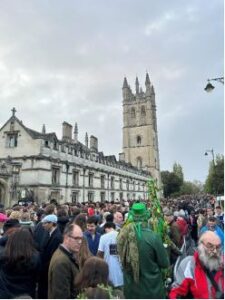Kategorie: ‘Course of Study’
Practical year in Kilkenny
- Medicine
- Ireland, Kilkenny
- St. Luke’s General Hospital
- 07/2023 – 09/2023
My time in Kilkenny was an outstanding experience that combined enhancing medical skills with
personal enrichment. This report reflects about different aspects of my stay, such as the
application process, finding an accommodation, my everyday routine during the internship, and
my explorations of Ireland’s stunning landscapes.
1. Application/Finding an internship
I discovered St. Luke’s General hospital during an online search on the webpage PJ-ranking. This
webpage is used for writing reviews about the internships throughout the practical year and
students may leave contact addresses to facilitate connections between medical students and
healthcare institutions. The webpage featured positive reviews about the hospital in Kilkenny,
indicating its reputation for providing valuable learning experiences and exposure to various
medical specialties. The opportunity to rotate through multiple wards, including gastroenterology,
cardiology, and the emergency department, was a significant factor that aroused my interest.
The application process for the practical year internship in Internal Medicine was initiated by
applying via email to St. Luke’s General Hospital in Kilkenny, Ireland. The application included a
comprehensive CV, a cover letter detailing the applicant’s motivations, relevant experiences, and
aspirations for the internship. After a few days I received a positive answer and was accepted. It
was well-organised and I received a letter of acceptance stating necessities which had to be
fulfilled. One of the primary requirements for participation was the submission of proof of
vaccination against common infectious diseases. In addition to vaccination, the acceptance letter
outlined the necessity of obtaining comprehensive insurance coverage. This insurance was
specifically aimed at covering any potential accidents that might occur during the intern’s work
hours, especially those linked to medical errors. After submitting all necessary documents, I
booked my flight ticket and the journey could begin.
2. Accommodation & Living Expenses
While the hospital lacked on-campus accommodation, they provided valuable support by sharing
contact details of two landlords offering shared housing. I found myself settled into a cosy
residence just a 25-minute bike ride from the heart of the city and an even shorter ride of 15
minutes to the hospital. The landlord provided the bicycles, which facilitate transport a lot.
Kilkenny is connected to various cities through buses and has a train station. With the rent
amounting to a reasonable 165 Euro per week, the accommodation proved to be a good option
regarding prices in Ireland. The landlady’s kind demeanour and willingness to assist with any
concerns enhanced my stay. Living standard in Ireland is higher compared to Germany. There are
two cards that reduce prices on public transport and for visiting cultural sights. I would highly
recommend buying both cards. The leap card is for public transport and the heritage card for
attractions.
3. Everyday Life/The Internship
My daily routine during the internship typically started at 9 am with ward rounds or in the
outpatient department. Ireland does not have the concept of resident physician. Therefore,
patients attend their GP when facing a medical issue and will then be transferred to a doctor in
hospital as an ambulant patient. During my time I started working in the hepatology unit. Common
diseases with whom patients presented with were viral hepatitis, alcoholic steatohepatitis and
autoimmune liver disease. Later, I got the chance to follow the gastro team on the wards. What
truly set this experience apart was the hands-on involvement. Although students in their practical
year cannot work as much practical as in Germany, but the more my colleagues knew about my
skills, the more they allowed me to help them. My tasks varied between inserting i.v. lines, taking
histories, writing prescriptions and discharge letters. My work has always been supervised by an
intern, so I have never experienced feeling overwhelmed or being left alone. By mid-August, the
Irish students returned after their summer break. This was a great experience because we got in
contact quite quickly and did activities together. Moreover, by the time they came back they
established daily teaching sessions twice a day, enhancing my understanding of medical practices.
Kilkenny is a charming city located in the heart of Ireland with a rich history, vibrant culture, and
plenty of attractions to explore. After work, I had the chance to explore most of its cultural
heritage. Kilkenny Castle is a magnificent medieval building that offers an insight to Ireland’s past.
Second, there is St. Canice’s Cathedral. This historic cathedral features a round tower with
breathtaking views of the city and surrounding countryside. Not to forget about the traditional
pubs with live music. They really convey the typical image of Irish culture and tradition.
4. Free Time/Tips
Ireland’s nature is stunning! You have never seen 1000 different varieties of green? In Ireland you
will! Its rainy days must be mentioned as well, but the moment you bought rain trousers and
wellies you are prepared; the journey can start. My exploration led me to places like Kenmare,
Ring of Kerry, Limerick, Killarney, Cork, Tramore, and Dunmore East’s stunning cliff walk. My
favourite trips were the Ring of Kerry and walking along the beach in Tramore. The Ring of Kerry
is a marvellous road leading you through the coastal region in the southwest.
And then there is Dublin. Dublin, with its iconic attractions, including Trinity College and Temple
Bar. Dublin, a digital hub, a vivid city with its rough north side and dignified south side. Dublin,
being a cultural centre with the national gallery of Ireland, Dublin castle and much more to be
discovered.
I would recommend having a car in Ireland, because it facilitated journeys to remote countryside
locations that public transport often couldn’t access. Luckily, one of the other German students
brought his car with him. From time to time, we took trips together.
5. Conclusion
In retrospect, my stay in Kilkenny was an experience I don’t want to miss. The combination of
getting to know a different healthcare system, learning medical work in another country and being
warmly welcomed made my stay unforgettable. It has enriched me in so many ways, being it
personal or professional. Therefore, I am grateful for this experience.
Research internship at the University of Oxford
- Electrical Engineering, Information Technology and Computer Engineering, B. Sc.

May Day at Magdalen College Tower
© Benedikt Wahl - United Kingdom, Oxford
- University of Oxford
- 04/2023 – 09/2023
The questions, I probably got asked the most from friends and fellow students, is how I got the research
internship at the University of Oxford. That’s hard to answer since there is no clear path for that as far as I
know. I wrote e-mails to multiple professors at different institutions both in England and the United States
and one of them got back to me and offered me the internship in Oxford. Although there is always luck
involved, there is definitely one thing, I’d like to point out. Those professors get tons of similar requests
from maybe similarly suitable candidates. Hence, the application should be tailored to the lab in order for
the professor to even open the CV. In any case, I would always just give it a go and try it out.
Something to consider is that research internships are often unpaid. Although there are some scholarship
programs for internships in place, the money, you get, won’t cover all living expenses.
Regarding housing, the most convenient way is to text the housing officers of the colleges (I wrote an e-mail to all of them) and ask if they got free housing during the internship period. I got an offer from Exeter College and was really happy about it because it was easy to organize it from abroad. At the colleges,rent is usually paid per day, and comes in around 600-900£ per month from what I’ve heard. Something
that everyone should keep in mind is that the National Healthcare System (NHS) works different from the
German healthcare system. So I would highly recommend to register with a GP right upon arrival
because that gives you (1) an NHS number and (2) allows you to go to a GP faster when you need it.
Unfortunately, I didn’t know that and when I got sick, the earliest appointment, I was offered, was seven
days in the future. To get a faster appointment (at a private doctor), private travel health insurance can be
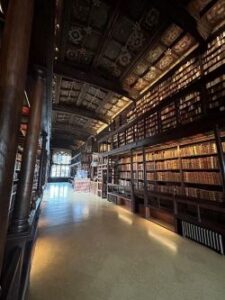
Duke Humphrey’s Library at the Bodleian Libraries
© Benedikt Wahl
very helpful. With that, I got an appointment the next morning.
So far this might have sounded a bit pessimistic but as soon as I got to Oxford, all the organizational
hustle was made up for. Hosting the oldest English speaking university in the world, the city is rich in
history and traditions which they preserved over the centuries. An event that I’ll never forget is May
Morning. On May 1st people from all over the city come towards the tower of Magdalen College. At 6 a.m.,
the bells of Magdalen college tower ring and the college choir sings to welcome the month of May.
Afterwards everyone walks through the city where plenty of other events take place. This tradition is
ongoing for over 500 years.
In general, the college structure makes Oxford stand out. To be part of this community as an intern, the
best way is to become an associate member of one of the middle common rooms (MCR). The middle
common rooms can be explained as a society for all graduate students at a college. Each MCR has it’s
own constitution which describes the conditions under which you can become associate member. At
Exeter College, that was pretty straightforward for me since living in their accommodation was sufficient
to request entry into the MCR. With the MCR membership at Exeter College, I got many perks including
subsidized lunch and dinner in the college’s hall (the dining room for students) as well as 24/7 access to
the college’s historical site. My favorite events, I could also attend thanks to the MCR membership, have

View from the garden of Exeter College over the Radcliffe Camera, University Church St Mary and All Souls College
© Benedikt Wahl
been formal dinners where we had really fancy food and dressed up in suits located in the college’s hall.
Formal dinners have been part of the college life for a long time and many traditions have been kept over
the centuries like the throne for the rector in the case of Exeter College. Besides the colleges, there are
as well plenty of other clubs and societies. In contrast to German universities, many of the sport clubs are
thereby really competitive since they compete on a national and international level. In general, Oxford is a
great place to connect to like-minded people from all over the world.
At work, there are some differences to German universities. To begin with, research groups tend to be
much smaller resulting in most professors supervising less students. My professor supervised just 4
students (including PhD candidates) and 2 post-docs. In addition to that, most researchers came to work
later than in Germany, resulting in the start of a typical working day just around 9 in the morning.
Overall, I really enjoyed my stay in Oxford and I will definitely stay in contact with my supervisor there in
the future.
Wonderful experience in Eindhoven
- Electrical engineering, information technology and computer engineering M.Sc.
- The Netherlands, Eindhoven
- Stichting imec Nederland
- 02/2023 – 08/2023
The internship
I really enjoyed the internship at the company imec. Imec is a belgian company and founded the Holst research center in Eindhoven in 2005. Imec is an industry related research center in the field micro and nano-electronics and deals with technical projects in the areas of health & vitality, energy &climate, mobility & industry 5.0. The application was quite straightforward, and I already had feedback and the (digital) interview within a few days. Starting the internship, I noticed right away that the team is quite young and insanely nice and friendly. Everyone is super helpful, open and you feel right at home. There were always recreational after-work activities with the team that you could participate in if you wanted to. Since the team was also very international, it was no problem that I didn’t speak the language, because everyone spoke English anyway. The Holst center is located on the so-called High Tech Campus. On the High Tech campus, many different technical companies are located and there is an area with a supermarket, a few restaurants where you can eat something at lunchtime and a gym. Due to the many green spaces and a small lake, the High Tech campus is also suitable for a walk and therefore quite a nice location for an office.
My internship was part of the health department where an implantable stimulation electrode was developed. For me, that was the perfect project as it combined the electrical engineering and medical aspect in such an interesting way. I learned a lot and I felt very valued because my opinion and ideas were very well appreciated by the rest of the team. Beside the daily work I also had a weekly progress meeting with my supervisor and imec, where we discussed my latest work and the upcoming steps. I felt very well taken care of, as thoughts and ideas could be freely expressed and my questions were always answered.
Accomodation and living expenses
One of the more difficult aspects was to find a room to stay, since there are generally too few housing options for students in Eindhoven. I used the site kamernet.nl and was lucky to find a room. The site has a monthly fee in order to be able to contact the landlords, but I would advise everyone to invest this money. I wouldn’t recommend using Facebook groups, because there are many scammers. The rents are relatively expensive, and one must expect about 500 – 600 € for a room in a shared flat. In general, the Netherlands is a bit more expensive than Germany, both for food but also for going out.
Eindhoven and surrounding
Eindhoven is a modern city. The city center is quite large and there are many stores, restaurants and bars. In particular, there are also somewhat exotic restaurants such as Indonesian or Ethiopian. Due to the existing university, there are also many young people around. Especially in summer, the various parks are very well attended and are very nice to enjoy the weather and nature. It is advisable to get a bicycle for the time here, as this is the best way to get around. There are very good and safe bike paths and almost everything is optimized for cyclists. I took mine from Aachen, but otherwise there is also the possibility to rent a bike at Swapfiets. To travel to other cities on weekends, the trains are particularly suitable. I can only recommend at this point to visit the cities of Utrecht and The Hague, because they are both beautiful. The app “9292” shows all bus and train connections within the Netherlands and is therefore very useful.
Conclusion
All in all, it was a wonderful experience. I was able to learn a lot during the internship and also the working atmosphere was very friendly and welcoming. The company imec has a lot of different and very exciting projects and therefore I would recommend everyone to have a look around here if you are looking for an interesting internship.
Internship in Eindhoven
- Electrical Engineering M.Sc.
- Netherlands, Eindhoven
- ASML
- 04/2023 – 08/2023
Application:
As I was looking for a place for my mandatory internship, I was first and foremost looking for a good company to stay at. The actual country to which this internship would take me was secondary to this for me, although the idea of living outside of Germany for a while did excite me. Due to the Erasmus Internship program I could freely explore internship vacancies within the European union without much worries, which opened many possibilities for interesting companies. The application process in my experience is similar to many German companies, although the interviews and documents were of course in English.
Accommodation & Living expenses:
Finding accommodation in the area around Eindhoven is hard. The housing market in that region is quite exhausted due to a high number of students who are attending the local university, and the local high-tech campus with large companies like Philips and ASML who have employees with much larger budgets looking for flats as well. The prices for rooms in shared flats are high, and even then, getting a place in one is difficult. Furthermore, some local (private) student housing providers only accept students of the local university. Due to the short duration of my stay, I did not have much success in getting accommodation through the local web portals like kamernet which are popular to find roommates either. In the end I luckily found a stay through an initial Airbnb booking, but this method is far from reliable. The expenses for groceries are higher than in Germany, but still affordable. The main problem is for sure finding accommodation.
Everyday life / The internship:
One of the most important tips for everyday life is surely to get a bicycle. The entire region is very accommodating for cyclists, and with the little height differences in the Netherlands cycling is a very comfortable way to get around. My company had an entire bicycle parking garage, as well as bicycle paths. Downtown areas too provide easily accessible parking spaces for bikes, which often makes them the most reliable method of getting around. It is often times even faster than taking the car. There are offers which rent out bicycles for quite a good price on a monthly basis, with full insurance as well, which I would recommend looking into so that you don’t need to bring your own bicycle with you.
During the internship the people I have encountered were all quite cheerful and not very keen on hierarchy. It is common to talk on a first name basis with every superior, and all members of our team were sitting in one open office with an open-door policy (well we didn’t have doors after all). There is a large focus on mental health, preventing burnouts, and team building, which was very nice to experience. As an intern I profited of this fundamental attitude a lot, since I was free to go around and ask anyone for help if needed and got to know the people much quicker than I would have with individual offices or a more secluded workspace. I felt part of the team quickly, and towards the end when some of my coworkers referred to me when tackled with problems I had dealt with during my own project I felt like the team had properly included me although I was bound to leave again.
Free time / tips:
As mentioned above, I would heavily recommend bringing or get a bicycle to get around. Other than that, I can recommend asking coworkers for help if you are looking for anything or need help with something, even outside of work. From my experience they are happy to help you settle in and get adjusted quickly.
In my opinion the city of Eindhoven is not that much of a tourist attraction, so look around a bit further to see where you want to go in your free time. There sure is a lot to see, just maybe not right in front of your doorstep.
Conclusion:
All in all, I can recommend an internship in the Netherlands very much provided you can find an accommodation, where availability heavily depends on the city. The country is especially appealing to students with its focus on bicycles, which are a lot cheaper to maintain than a car. The cost of living, although more expensive than Germany, is manageable. The people are very welcoming, and it’s quite fun that many are excited to test their German skills when they learn where you’re from. The culture and language are close enough to German so you can get around, while still providing the experience of a foreign country. In case something goes majorly wrong you can return to Aachen within a few hours so that the first longer term foreign stay is not all too scary. In conclusion, for anyone who wants to dip their toes into going abroad, going to the Netherlands is a great start.
Internship in Antwerp
- Business Administration and Engineering: Mechanical Engineering M.Sc.
- Belgium, Antwerp
- Evonik Industries AG
- 03/2023 – 07/2023
1. Application/Finding an internship
The path to my internship led me though the Unitech program which I can very much recommend.
Because of that, I will explain the program here shortly. More information about it can be found under
unitech-international.org and via the RWTH where it is listed under the options to go abroad. It is a one
year long program for engineering students by the Unitech International Society which is a network of
European universities and partner companies. The program usually consists of an exchange semester in
fall/winter and an internship in spring which are joined by three weeks of additional activities in the
beginning, the middle and the end of the year. There, students meet, work on projects and are coached in
non-technical skills such team work or leadership. So overall, you are getting to know an even larger
group of people as well as making contacts into the professional world when compared to a normal
exchange. Additionally, it allows for an internship experience abroad, if you want. I am convinced that
without Unitech, my goal to do an internship abroad that fitted my study background and interests would
not have been possible in a comparable way. It created a platform to meet and discuss my goals and
interests with the participating companies to find the internship.
It is worth mentioning that (longer) internships are not that common in Belgium during the studies and
have to be confirmed by the regional government. This seems to ensure that students are not used as
cheap labor. The company needs to hand in an internship plan defining learning goals etc. This was
quickly assessed and accepted, so in my case no problem and I was supported well by the company.
2. Accomodation & Living expenses
The chemical industry cluster in the Port of Antwerp is one of the biggest in the world, stretching for the
city for around 30-40km up the river Scheldt to the Dutch border. The companies present there are
connected to the city by a bus system and dedicated lines for cycling. Antwerp is also beautiful and a
great place to live which played a role in convincing me to take on the internship. Thus, it made perfect
sense to search for accommodation in the city, which is also a student city and has a lot of housing
opportunities. Whether you are allowed to take a student housing as an intern depends on the
organization, but I found a place to stay this way and lived the months in a student room with a big shared
kitchen for the whole floor. It was a fairly new private building and living conditions where excellent. Prices
are higher than in Aachen, but I am confident in saying that something decent can easily be found for
500-600€ a month like in my case, with more time also below that.
Living expenses in Belgium are slightly higher than in Germany, although I spent my time there in an
inflationary period so that when coming back, I had to realise that prices were not same back home to
compare with. Especially food and stuff you would buy in dm or Rossmann I definitely found more
expensive and worth bringing from Germany from time to time and as far as possible.
In terms of taxes, insurance and other expenses, I can only say that as an EU citizen I was able to keep
the German insurance and paid a relatively small amount of income tax as a student. I have no
information on what general rules apply, just my specific case.
3. Everyday life/ the internship
First of all, Antwerp is not too far away from Aachen, within the EU and with a surprising high share of
German speakers, at least among the older generations. From that perspective, cultural differences are
surprisingly big and were in my view a very positive experience. I experienced people very open,
welcoming and very good in speaking English. French on the contrary is not as helpful and welcome as
Antwerp is in the Flemish speaking part and not in Wallonia. The differences like the language between
the different parts of Belgium (also the lack of understanding between Flemish speaking regions) where
very interesting to learn about.
I worked form 8:00 to 16:45 and took 30 mins by bus before and afterwards that was free and organized
by the industrial hub for commuting workers. Cycling is very popular in Antwerp and with summer
approaching, I also used my bike for the 17km commute along the river. This was not as beautiful as it
may sound, as the view is dominated by (petro-) chemical industry and container terminals, but
impressive and excellent in infrastructure for cycling. This goes for the whole city as well, as there is a
great well-balanced mixture of modes of transport. Cycling to work is also supported by a certain amount
of money depending on the distance. This would not have been necessary to motivate me, but indicates
the local will and need to get people away using from cars.
My work at one of the present chemical industry sites focused on how to achieve sustainable energy
supply, which very well suited my study background. There are mainly production sites of multi-national
corporations and it was very impressive as well as a bit intimidating to be part of the production of modern
Society’s needs for fuels, plastics, nutrition, fertilizers, care products and all other chemical products
concentrated in one area. I can recommend visiting not only to people with my specific focus on energy
engineering, as it shows the challenges that contradict the notion of just having to transition such an
existing infrastructure and ecosystem to climate neutrality quickly when ambition, will and the necessary
technical solutions are all there. I was allowed to support in projects with the goal to achieve this and it
gave me great insights how this is approached and how my acquired knowledge can be applied.
4. Free time/tips
I lived in a part of the city called Eilandje, which is in the North of the city and very recently modernized
and built around the old docks that are now too small for modern big ships and mainly used for leasure
boats. This means there is a lot of wide space around the water together with museums, bars and
restaurants as well as possibilities to spend free time. In contrast, in the central old town you find beautiful
streets and squares around the cathedral close to the river bank with the Market Square and even more
restaurants and bars. Between the two parts of the city, there are a lot of student homes and activities so
that this overall area is probably the best area to stay in Antwerp, although the South of the city is nice as
well.
Compared to other Western European cities, you will find most of what is a trend and successful brand in
other countries also present in Antwerp. Nevertheless, the restaurant and bar culture is more vibrant and
young people seem to be around a lot. Next to the opportunities the city itself has to offer, it is relatively
easy to get to Rotterdam and Amsterdam in the North as well as Brussels, Gent, Brugge or even Paris in
the South. Even though Antwerp has the second biggest port in Europe, it is still quite a bit to the coast
but it is probably no problem to go there as well.
5. Conclusion
All in all, I can recommend Unitech or any other path to an internship abroad, even if it is seemingly close
by like Belgium. Belgium to me is a very interesting and beautiful country I would never have discovered
in such a way and my stay allowed for numerous different perspectives and insights I would not want to
miss. I spent a great time and can recommend the country, the city of Antwerp and the idea to work or do
an internship there.
Research visit at Cornell University
- Mechanical Engineering, PhD
- USA, Ithaca
- Cornell University
- 03/2023 – 05/2023
- Application/Finding an internship
Since the start of my Ph.D., I planned to do a research visit abroad, and I was constantly looking for research questions that were suitable for it. Even though my ideas did not really convince me, I scheduled a meeting with my Ph.D. advisor. In this meeting, we discussed possible research groups which fit my research topics. Based on this, I picked a research group and developed a work plan for the stay. With that plan, my advisor contacted the guest professor, which agreed to the exchange. The next step was the official application as visiting non-degree graduate student. I got an administrational contact person that help me with the application. Besides typical application documents like certificates and a statement of purpose, proof of financial resources is required. A fellowship granted by Cornell University covered my tuition fee, so I only had to proof financial resources for living expenses and obligatory health insurance. Once the application process was completed, I received my admission letter and the I20. Both documents are required to apply for a visa. I started the application process 3.5 months before the start of my visit. In the end, I almost ran out of time and received my visa just a week before departure. Hence, I recommend starting the application process earlier.
- Accommodation & Living expenses
The beautiful campus of Cornell University lies on a hill above the city center of Ithaca. In close vicinity to the campus is College Town, which is the main area for student living (like Pontviertel). The convenience comes at a cost. In my experience, prices are quite high and conditions low. I spent 800$ on a small (12m2) room in a six-bedroom apartment with only one bathroom. Luckily, there were only three of us living there. To find an apartment, I asked the administrational contact person for help. Even though that provided some opportunities, I took the room that I found online on apartments.com. In general, I think it is not necessary to live in College Town. The local buses, which Cornell University operates, are free of charge for students and cover the city well. Living expenses are, in general, higher. For lunch on campus, you have to spend between 8 and 15$. In particular, groceries are substantially more expensive than in Germany, making it almost as expensive as going out for food.
- Everyday life/the internship
My everyday life was similar to my life at RWTH Aachen University. I got an office space in Upson Hall, which is one of the engineering buildings. The group that I visited covered two office rooms plus the office of the guest professor. My office space was within these office rooms, so I was fully integrated into the group. The group was very kind and made me feel very welcome. We went together for lunch or had dinners together. A small difference to my everyday life in Aachen was the more spontaneous interaction with the guest professor. He was basically every day available for discussions, which he showed by leaving the office door open.
- Free time/tips
Ithaca is smaller than Aachen but provides enough things to spend your free time. In addition, I highly recommend renting a car to discover the surrounding countryside. To keep this easy, I list my highlights in Ithaca and the surrounding countryside:
- Watkins Glen State Park
- Cascadille Gorge Trail
- Taughannock Falls State Park (The park at the lake is also very nice)
- Ithaca Farmers Market
- Ithaca Beer Co, Liquid State, Garrett, Salt Point (Breweries that serve delicious beer and tasty food)
- Rhine House (Best bar)
- Dos Amigos (Best burrito)
- Conclusion
My research visit at Cornell University was professionally and personally a success. I substantially advanced my research, bringing me a step closer to my Ph.D. Moreover, I gained helpful impressions about the American academic system, which are helpful for planning my future career. Finally, I met so many nice people that I look forward to seeing again.
Internship in Oslo
- Molecular and Applied Biotechnology, M.Sc.
- Norway, Oslo
- Universitetet i Oslo
- 05/2023 – 07/2023
After looking for some alternatives outside the EU, I decided to search for an internship position in the EU and apply for the Erasmus+ funding. This was was with comparably few preparation time and less bureaucracy possible. To find an internship position, i visited the websites of universities I found interesting and searched for departments that work on topics that are interesting to me. I did not search for specific open position, but just wrote short formless mail to the professors or group leaders, introducing me and stating my interest. This worked very well and I had to contact less than five research groups to find an interesting project.
To find a place to live, I took a look at the offers from the University. In Oslo, this is SIO. They care for student cafeterias, housing, and do even have a fitness studio. The hosing application was simple and is worth a try. Even if you might be not quite sure, in which category of applicant you belong, you can ask them or also try what sounds best to you. The people there were very friendly and everything was very uncomplicated. For me it was important to live in a shared flat, because this makes meeting new people much easier and you will never be alone. Living expenses are indeed like everyone says more expensive than in Germany, but regarding the inflation in Europe and the the weak exchange rate of the Norwegian krown at the time, normal groceries were not too much more expensive.
I lived together with other students, mainly from Italy and one person from Germany, that made an Erasmus semester in Oslo. The dormitory was full of Erasmus students and it was easy to meet new people. Unfortunately, I arrived at the end of the Semester and most other students left after my first of three month. If possible, it might be an asset to plan you stay according to the semester start in you city of destination as then are much more social activities.
I travelled to Norway by car, what made it possible to carry a bicycle with me. But travelling by Train and Ferry or by Plane also works very well. For the mobility in Oslo, I can highly recommend to either bring a bicycle with you from home, or buy a cheap one in Oslo. Public transportation in excellent in Oslo, but also expensive, especially if you do not have a student status. By bike you are much more flexible and see much more of the city.
In the Institute I worked, the working atmosphere was very nice and welcoming. As a student I was invited to all meetings and free time activities, but never felt forced to participate anywhere. The first part of the Internship was very relaxed and some things did not work right away, but my supervisors were very supportive and always helped me when necessary. They also handled the pressure very healthy in the final part of the internship. I did work a lot in the last weeks, but this decision was left free for me and I was not set under pressure by my supervisors.
All in all, my Internship was a very enriching experience. I made my internship in a field I was so very proficient in before. This made it quite challenging for me, but on the other hand I feel like I have learned an incredible amount of things during these three month.
I planned to do some vacation after the internship and my supervisors helped me to plan the submission so that this is possible.
Working in a hosptial in Saint-Pierre – La Réunion
- Medicine
- France, St. Pierre
- Centre hospitalier universitaire la Reunion
- 03/2023 – 07/2023
Application:
I applied about a year in advance through the e-mail address etudiants-medecine@chu-reunion.fr. The application required a CV, a letter of motivation and the certificate of matriculation. Compared to Martinique and Guadeloupe, you get a pretty reliable answer when applying for la Réunion. At first, I only received a confirmation that the application had arrived, and even with more inquiries, I did not receive the final acceptance until the beginning of December. Therefore, perseverance and patience are required. However, the lady in charge, answered all my questions very quickly and reliably. After the acceptance, I still had to send some documents such as a copy of my passport, liability insurance and vaccination certificates. Overall, I found the application process somewhat lengthy but uncomplicated.
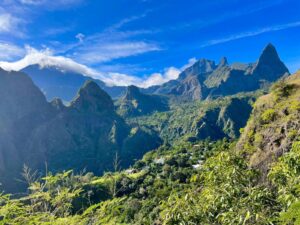
© Jana Mattes
Accommodation and living costs
I started looking about 1-2 months in advance. The French and also the Reunionese are still very active on Facebook, which is why I joined various Facebook groups (just enter Colocation Saint-Pierre/ Coloc Réunion or similar on Facebook). Furthermore I searched on Airbnb and leboncoin. Leboncoin is more or less the French Ebay. In the end, I found a small one-bedroom apartment near the central bus station on leboncoin. I also bought a bicycle through leboncoin, which I also highly recommend for the way to the hospital, as traffic is really annoying on the island. The apartment was quite expensive (800 euros/month) and since I got to know two other German students over time, I moved in with both of them after two months. Here it is worth asking around in the hospital if there are doctors who travel for a while and unrent their house. We were lucky and lived the last two months in a large house with a pool 5 minutes walk from the hospital (400 euros/person).
Also, if you want to do something on the weekends, it is worth renting a car. Five of us shared a car for 450 euros a month. There are buses, but these often do not go to the starting points of the hikes and you are much more flexible with the car.
Otherwise, I have found the cost of living is not much more expensive than in Europe. You can get fresh fruit and vegetables very cheaply at the weekly market and free lunch at the hospital.
The internship
My workday began at 8 a.m. in the visceral surgery department. At first, no one really felt responsible for me. A nurse got me work clothes and then I went along on rounds. The rounds were generally kept very short and there was no teaching. After that, I was always sent to the operating room. Since there was only one resident at the time I was there, I was often the first resident in the operating room. Here, questions were always answered nicely and the atmosphere in surgery was very relaxed and less hierarchical compared to Germany. Once or twice I was also allowed to help with suturing, but in Reunion, unlike in Germany, this is often done by the senior physicians themselves.
At noon, I almost always had lunch with the other erasmus-students and since the doctors work relatively long every day (until 18/19h) and do not send you home, I went home at some point usually around 3 or 4 pm.
After 6 weeks in the visceral surgery I changed the department, because I also wanted to see other departments. This was possible without any problems. I then spent 2 weeks in the emergency room. Here I was able to work very independently, examining patients, suturing and writing reports.
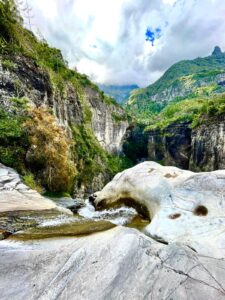
© Jana Mattes
The last weeks I was in the orthopedics department together with 3 other erasmus students. Here I often switched between the outpatient clinic and the operating room, the doctors here were really nice and the medical standard was quite high.
Overall, you have to have a high level of personal commitment and show a lot of initiative to learn something, but if they notice that you are interested, it is quite possible to learn a lot. You can also arrange the working hours as you like. The doctors are overall very relaxed and nice, but they don’t really know what to do with foreign students. In addition, they don’t pay much attention to possible language barriers, which is why I only recommend an internship there if you speak a sufficiently high level of french.
Free time
Reunion is an really beautiful island in terms of leisure! For anyone who loves hiking, climbing, nature and outdoor activities, the island will be a paradise. We spent most weekends backpacking and camping in the mountains. Must-dos are of course the volcano, Piton de Neige and Mafate. During the week, we often went to the beach bar on the small beach of Terre Sainte in the evenings. On Sunday evenings there are always free live concerts in Saint Leu, which are worth a visit.
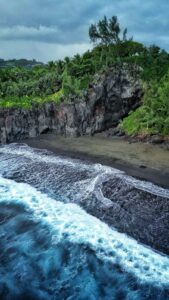
© Jana Mattes
There are always many new people on the island who only stay for 1-2 years, so it is quite easy to meet new people. Also in the hospital we were a group of one Spanish, three Germans and three Swiss. French students were few, because in la Réunion you have to continue studying on the mainland after the 6th semester.
Overall, of course, it was very hot and humid in the first months (March, April), then it cools down considerably in the winter.
Summary
Overall, I can recommend a stay on la Réunion to anyone who likes nature and mountains. The landscape there is simply insanely diverse and beautiful. In the hospital you have to be very proactive and stay quite long in the evening if you want to learn something. Otherwise, you can be very flexible with your working time and also take a day off if you want.
Clinical rotation in the department of surgery in Bruneck, Italy
- Medicine
- Bruneck, Italy
- Università di Verona
- 03/2023 – 07/2023
1. Application/Finding an internhip
The preparation for my hospital internship in surgery was very smooth. I applied 7 months
before my stay at various hospitals throughout South Tyrol. I was able to find an internship for
the entire 4 months in Bruneck. Although everything worked out well I would recommend
applying earlier to be on the safe side. There was a dedicated contact person, Dr. Neumair, at
the hospital in Bruneck who handled communication with the University of Verona. She
ensured that everything was arranged for my stay. Working with her was extremely helpful and
reassuring, as it allowed me to focus on the professional aspects of my internship without
worrying about organizational matters. The International Office was also very helpful with my
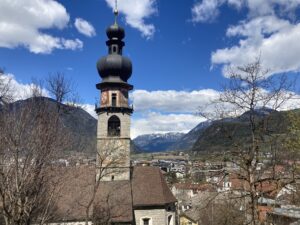
Bruneck
© Felicitas Weiß
Erasmus Plus application, providing clear guidance and prompt communication with the
respective contact persons. Their support made the process stress-free, enabling a rewarding
international academic experience during my hospital internship.
2. Accomodation & Living expenses
After a quick research on the internet (http://accommodationunibz.blogspot.it/) I was able to stay in a 5-person shared
apartment with other students from the University of Bozen. For 520€ per month I got a fully
furnished 17sqm room. The shared apartment had great common areas with a pool table and
Netflix account. There was also a laundry room and a cleaning lady who came every two weeks.
The accommodation was perfect and allowed me to have a pleasant stay during my internship.
There were also some cheaper rooms for subletting, but I preferred to live in a shared apartment
so I could connect with people who live in Bruneck and know the area.
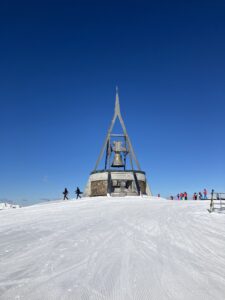
Kronplatz
© Felicitas Weiß
The cost of living in South Tyrol is comparable to Germany. Groceries are a bit more expensive.
However, public transportation is quite cheap and reliable. Most importantly, aperitivos are
cheaper than in Germany and are usually served with a small snack on the side!
3. The internship
My surgery rotation was an enriching and rewarding experience. Working in the general surgery
department provided a wide range of opportunities, from assisting in the operating room to
helping out in the outpatient clinic and the emergency department, known as “pronto soccorso”.
Everyone in the team was genuinely kind and welcoming, always ready to answer questions
and eager to receive assistance.
The hands-on experience was good. I was given the chance to examine patients, perform
ultrasound scans, and even practice suturing. The surgeons made me feel like a valued member
of the team. During quieter times in general surgery, I was encouraged to observe and assist the
orthopedic team.
The hospital staff must speak both Italian and German, so it is easy to communicate with them.
There are only a few patients who speak only Italian or Ladin. In these cases, the nurses
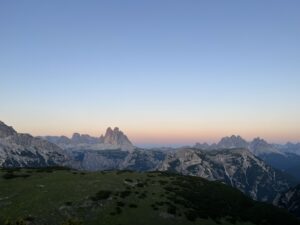
Zinnen-Blick
© Felicitas Weiß
translate, and after a while I picked up the common expressions and was able to use them
myself. If you are not from southern Germany, the South Tyrolean dialect can also be a bit
difficult at first, but you understand it with time.
My day started at 7:45 am and I usually stayed until 2:30 pm. Sometimes I could leave earlier
or had to stay longer to assist in the operating room, depending on what surgeries were coming
up. Besides me, there were five other students in general surgery and trauma surgery, so we set
up a rotation schedule so we didn’t have to come in every day or could leave early. Our schedule
also included weekend duty (on-call shifts). In return, we got two days off during the week.
A definite highlight was the cafeteria’s delicious meals. As students, we enjoyed complimentary
access to a variety of Primi Piatti, Secondi Piatti, a salad buffet, and delicious desserts.
4. Free time/tips
During my free time, I took an Italian language course at a language school to improve my
communication with patients. The course proved to be very helpful during my hospital
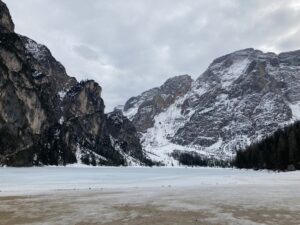
Pragser Wildsee
© Felicitas Weiß
internship and especially my travels afterwards and I would recommend doing one if you have
the chance.
When I arrived in March, the ski season was still in full swing, and with the Kronplatz as the
local mountain in Bruneck, it provided the perfect conditions for skiing. The snow-covered
slopes and breathtaking panorama made for unforgettable ski days. It was an excellent
opportunity to experience the beauty of the South Tyrolean mountains.
Later, I used my free time for extensive hikes to explore the nature of South Tyrol. The
surrounding landscapes offered a variety of hiking trails, lakes and summits. I strongly
recommend doing Piz da Peres and Peitlerkofel as well as a sunrise/sunset hike at Sambock.
In addition to exploring the local region, I embarked on exciting trips to some of Italy’s famous
cities. Venice, with its romantic canals and unique architecture, Verona with its impressive
Colosseum, and the fashion capital Milan were just a few of the captivating destinations. I also
visited Turin, Genova, Meran and the Garda Lake, each providing a different cultural diversity
and an immersive experience in the Italian way of life. It’s easy to reach those cities by train
and if you book in advance the tickets were very cheap.
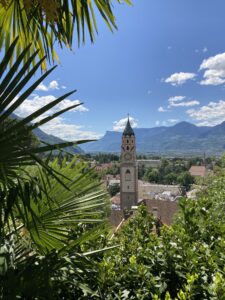
Meran
© Felicitas Weiß
The time spent with my roommates and my colleagues was also a highlight of my leisure
activities. We enjoyed the relaxed atmosphere of the aperitivo bars, went on great hikes, or even
paragliding together.
Overall, my leisure time during the internship was a perfect balance of active outdoor activities,
cultural explorations, and enjoyable camaraderie. The diverse opportunities the region offered
made this period an unforgettable and enriching experience during my time in the surgical
department.
5. Conclusion
In conclusion, my hospital internship in the surgery department was an incredibly enriching and
unforgettable experience. From the smooth preparation and comfortable accommodation to the
hands-on learning opportunities and supportive team, every aspect of the internship exceeded
my expectations. Additionally, exploring the beautiful landscapes, immersing myself in the
Italian language and culture, and forming lasting friendships with my colleagues made this
journey even more special. I am grateful for the knowledge and skills gained, and I will carry
the memories of this remarkable experience with me throughout my medical career.


